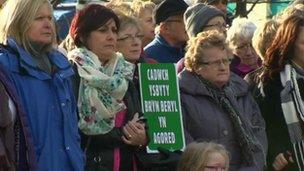Changes, promises and protesters
- Published
- comments

Protesters in Pwllheli
It hasn't taken long in 2012 for changes to the NHS in Wales to reach the headlines again. Over the weekend, more than a thousand people marched in Pwllheli against changes to Ysbyty Bryn Beryl - changes the local health board Betsi Cadwaladr insist are temporary, and as a result of winter pressures.
The atmosphere among campaigning groups already well established right across Wales seems pretty febrile as 2012 dawns, though. There's a "thin end of the wedge" feeling about any changes, temporary or otherwise because of the knowledge that this is the year that the major changes will have to come to the health service. Hence the marchers braving the chill in Pen Llyn this weekend.
Past reconfigurations have had a chequered history - some watered down after protests, other scrapped for what many would see as pretty openly political reasons.
The evidence? Well, there are still around 113 hospitals in Wales.
Is this process different from the ones which have come before?
Well, yes - largely because the NHS in its current form and structure has gone from being financially rickety to completely unsustainable. It started the current financial year with a £456m funding gap, has managed to find savings of around £295m, and taken £145m extra in-year from Welsh Government and health department reserves. The remaining £16m or so is yet to be found. Not what one would call a sustainable state of affairs.
The protests thus far have been little more than skirmishing, but we're now just a couple of months away from finding out the full details of the changes ahead. Here are some notes for your diaries:
• Pre - Consultation engagement between now and April 2012
• Presentation of Consultation Proposals: May to June 2012
• Formal Consultation Period: June, July, August, September 2012
• Proposals Review: August/ September 2012
• Final Plans Agreed and Implementation: August 2012 onwards
One Welsh council leader has already suggested, external what she thinks of some of the protests.
It's going to be a bumpy six months ahead for the Labour Government. Which is perhaps why they're preparing a strategy to get on the front foot about what they've achieved so far, following the opposition claims of inaction and, frankly, laziness.
The party's decided it's time to shout about what it's done since May's election, while, they feel, the other three parties have been effectively navel gazing, looking up only occasionally to shout insults across the chamber at them.
The last thing Labour wants is to be seen as the party of closing hospitals, which is why it would much rather trumpet its achievements and manifesto pledges. But one of those - health related again - may well come under close scrutiny this week.
One of Labour's five key election pledges was this:
"Because of the central importance of accessible GP care services, we will require GPs to make surgeries more accessible to working people, so that they can access local GP services in the evenings and Saturday mornings."
Since May, work's been under way to implement this pledge and the health committee is pretty interested in how that accessibility will work in practice - and how much it will cost.
The Health Minister will give them an update on Wednesday, and tell them that so far, after considering a range of options, they will start by "redistributing appointments during contracted core hours towards the latter part of the day - from 5.00pm to 6.30pm".
Now there may be some of those voting Labour last May who liked the idea of being able to go to their GP in the evening without having to interrupt their working day. I'm not sure how many of those would have recognised a last appointment at 6.15pm as a radical change from the current situation.
Perhaps a clue comes in the cost element - according to the Minister: "there will be no additional cost implications of redistributing appointments within contracted hours".
As for Saturday morning access, these, the committee will be told, may be delivered via the existing Out Of Hours service.
As Local Health Boards grapple with major changes to the way the health service works, the Welsh Government seems to be finding that more minor changes are no less tricky.
At the very least, while fending off accusations of being a "do nothing" government, they're finding that doing anything in the health field is tough going.